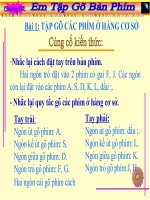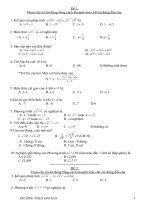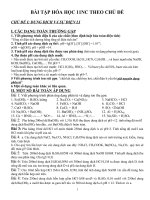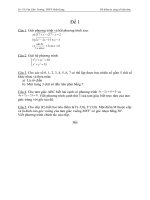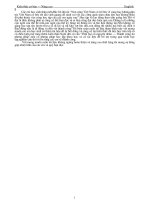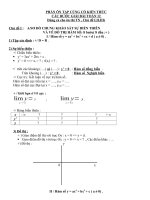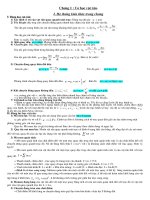cung co kien thuc A 8 Unit 1 2 3
Bạn đang xem bản rút gọn của tài liệu. Xem và tải ngay bản đầy đủ của tài liệu tại đây (138.97 KB, 4 trang )
<span class='text_page_counter'>(1)</span><div class='page_container' data-page=1>
<b>Unit 1, 2, 3</b>
<b>I.Tenses</b>
1. Thì hiện tại đơn giản và thì q khứ đơn: Cơng thức và cách dùng xem trong bảng.
2. Chú ý: - Thì hiện tại đơn còn đợc dùng để diễn tả hành động sẽ xảy ra trong tơng lai thờng dùng cho lịch trình, thời
gian biểu, chơng trình hành động….các hành động này chắc chắn sẽ xảy ra trong tơng lai.
eg: When do they collect and empty garbage? - On January 9.
- Thì q khứ đơn cịn đợc dùng để kể lại một chuỗi hành động xảy ra kế tiế nhau trong quá khứ. Hoặc nó
đ-ợc dùng để kể về tiểu sử của một ngời nào đó.
<b>Exercise 1: Put the verbs in the brackets into the present simple.</b>
1.She………..(not drink) coffe. She ………(drink) Coca Cola.
2.It……….(be) often hot in the summer.
3. What……….you………..(do) every evening?
4. The earth……..(circle) the sun once every 365 days.
5. I………..(see) her very often.
6. Vegetarians………(not eat) meat.
7. Bees ………..(make) honey.
8. Rice………(not grow) in cold climates.
9. Where……….Martin……….(come) from? – He (be)………..Scottish.
10. The sun (rise)………. in the east.
11.She usually (go)……… to school on foot.
12.It (take) ………..me twenty minutes to go to school everydday.
13.I (not like) ……….watching football.
14.…….you (go) …………..there tomorrow?
15.Most rivers (flow)……… into the sea.
16.They (be)…………. here in ten minutes.
17.My father (go)……… to Ha Noi yesterday.
18.Where ………Martin (come)……….from?
19.………your father (work)………..in an office?
20.When I (be)……….young, I (like)……….. playing football very much.
21.We (finish) ……….our dinner half an hour ago.
22.The farmer (work)………..in the field now.
23.Mrs Green always (go)………… ……….. .to work by bus.
24.She paid for the ticket and (leave)………
25.Do you know that man who (smoke)………...over there?
26.Rivers usually (flow)……… ….. to the sea.
27.If it cost too much, I (buy)……….. a small one.
28.How often……… ….. you (read)………..a new spaper?
29.As soon as he (finish)………his work, he (go)………..home.
30.I (give)……… it to them when they (visit)………..us.
<b>Exercise 2: Open the brackets with the correct tense of the verbs.</b>
Bao (be)……(1) one of myfriends. He (be)……….(2) the most sociable. He usually (spend) ………..(3)
his free time doing volunteer work at a local orphanage. He (learn) …………...(4)well, so he always (get)……..(5)
good grades. Last year he (be)………..(6) the best one of our class.He (have ) ………(7) a 10 day- tour
in Nha Trang for the pride. He (say)………..(8) it (be)……….(9) very interesting there, he (meet)
(10) a lot of people, (see) ..(11) many interesting palces, (eat) .(12)
……… ………… ………
a lot of sea food and (buy)………(13) some souvenirs for us. He (tell) …………(14) me that he (go)
(15) to Nha Trang again next year.
………
<b>Exercise 3: Underrline the correct word in brackets for the best ansawer.</b>
1. I (was/ were/ am) born in Ha Noi but I (spend/ spended/ spent) most of my childhood in the country.
2. I (learn/ learnt/ will learn) English next year.
3. My mother usualy (cook/ cooked/ cooks) for my family.
4. Look! A man (running/ is running/ runs) after the train. He (wanted/ wants/ is wanting ) to catch it.
5. He (stay/ going to stay/ will stay) here untill she comes back.
6. Why are you working so hard? Because I (will buy/ am going to buy) a car so I’m saving as much as I can.
7. Dad! Can you mend it for me? Sorry, I can’t. Ask Mom she (will/ is going to) do it for you.
8. I haven’t got enough money to get a house. No problem, I (will/ am going to) lend you some.
<b>Exercise 4: Arrange the adjectives in brackets in the correct order.</b>
1.It is a (wooden/ round) table.
2. She is wearing a (green/ new/ beautiful) hair dress.
3. What a (sunny/ lovely) day!
4. My uncle lives in a (old/ lovely/ small) house.
5. That girl has (blue/nice/big) eyes.
6. he gave me (black/ leather) gloves.
7. My teacher has a (round/ pink/ small) face.
8. It’s a (small/ metal/ black) box.
</div>
<span class='text_page_counter'>(2)</span><div class='page_container' data-page=2>
<b> a) Đồng chủ ngữ: S + V( not) + adj/ adv + enough + to V(ngt). </b>
<b> Ex: She wasn’t old. She wasn’t in my class → She wasn’t old enough to be in my class.</b>
<b> b) Khác chủ ngữ: S +V (not) + adj/ adv + enough+ for O + to V(ngt).</b> <b> </b>
<b> Ex: The test is very easy. We can do it well. → The test is easy for us to do well. </b>
<b> c) Enough dïng víi danh tõ : S + (V not) + enough + noun (+ for O) + to V(ngt). </b>
Ex: He has money enough to buy that big house.
<b> 2. Too... to (q...đến nỗi khơng thể làm gì) = not…enough to: </b>
<b> a, Đồng chủ ngữ: S + V + too + adj / adv + to V (ngt).</b>
<b> b, Khác chủ ngữ: S + V + too + adj / adv + (for + O) + to V (ngt).</b>
<i><b> Too young = not old enough; too boring = not interesting enough; too short = not tall enough</b></i>
<i><b> Ex: He is too young to be in my class. = He is not old enough to be in my class.</b></i>
<b>Exercise 1: Fill in the gaps with: enough or too to complete the sentences.</b>“ ” “ ”
1. He hasn’t got …………....money to buy this car.
2. It is cool………for youto drink.
3. There is………..much pollution in big cities.
4. It is………high for me to jump over.
5. There are………....many people on the road.
6. There aren’t ………..chairs for these people.
<b>Exercise 2: Combine each of the following pairs of sentences into one sentence, using (not) adjective + enough +</b>
<b>to- infinitive.</b>
Eg: He is tall. He can play volleyball.
<i>He is tall enough to play volleyball.</i>
1. My sister is old. She can drive a car.
………
2. The radio isn’t small. You can’t put it in your pocket.
………
3. This coat isn’t warm. I don’t wear it in winter.
..
………
4. She is beautiful and intelligent. She can become Miss World.
………
5. The weather was fine. We could go camping.
..
………
6. Those apples aren’t ripe. We can’t eat them.
..
………
7. Mr. Robinson isn’t rich. He can’t buy a house.
.
………
8. The worker is clever. He can make fine things from wood.
………
<b>Exercise 3: Rewrite the sentencs in the other way with the suggestion so that the meaning is kept </b>
<b>unchanged.</b>
1.This montain is very high we can’t climb it.
This mountain is too………
2. Are you very tall? Can you reach that picture?
Are you tall………..
3. There are ten people in the room but there are only eight chairs.
There aren’t……….
4. This tea is very hot, I can’t drink it.
This tea is too………
5. This picture is $10.50, I have only $ 9.50 so I can’t buy it.
I haven’t……….
6. She is six years old, she can start school.
She is old……….
<b>III.Be going to : dự định</b>
- Công thức xem trong bảng chia động từ.
- Chúng ta dùng " be going to " để diễn tả kế hoạch hoặc dự định trong tơng lai.
Eg: I am going to play soccer tomorow morning.
She is going to see a movie.
<b>Exercise 1: Use "be going to " to make sentences : </b>
1. Lan / meet / her / friends.
2. I / help / my / parents.
3. You/ play sports on the weekend?
4. he/ do/ his homework?
5. They / not / watch T.V tonight.
<b>Exercise 2: Write 5 sentences telling about your plans for this weekend.</b>
Eg: I am going to visit my Grandmother.
</div>
<span class='text_page_counter'>(3)</span><div class='page_container' data-page=3>
3. ...
4. ...
5. ...
<b>IV. Adverbs of places:</b>
- outside = bên ngoài - here= ở đây - upstairs =trên gác, trên tầng
- inside = bên trong - there= ở đó - downstairs = gác dới, tầng dới
<b>Eg: He is not outside; Maybe he is inside.</b>
<b>They do not play football here; perhaps, they play there.</b>
<b>She is not upstairs; it is possible that she is downstairs.</b>
Exercise: Complete the following sentences, using the appropriate adverbs in the box:
inside outside downstairs upstairs there here
1. Last night someone broke into the kitchen and stole the microwave oven while we were...
2. He fell ...and broke his wrist(cæ tay).
3. We like that city so much that we are going ...again this year.
4. The visitors(khách du lịch) had to move...when it started to rain.
5. - Where do you live ? - I live ..., in this town.
6. Don't go ..., It's too cold.
<b>VIII. Đại từ phản thân: ( Reflexive pronouns):</b>
c dựng khi ta muốn nhấn mạnh vào chủ ngữ gây hành động hoặc nhấn mạnh tân ngữ của hành động. Nó có thể
đứng ở đầu câu, cuối câu hoặc sau chủ ngữ tùy theo mục đích sử dụng.
§TNX I we you you he she it they
§TPT myself ourselves yourself yourselves himself herself itself themselves
<i> Eg : I cut myself.</i>
<i> Hung do his homework himself.</i>
<b>Exercise : Complete the sentences by using a suitalbe reflexive pronoun:</b>
1.Janet is holding a mirror. She is looking at ………..
2.This TV is automatic(tự động). It can turn ……… off.(turn off = tắt)
3.Hai taught ……….. French.
4.Why is that man talking to ………..?
5.I cut ……….. shaving this morning.
6. Ha and Lan should do the test...
<b>V. Why - Because</b>
<b>Exercise : Make up questions with why... and then answer them</b>“ ” .
1. Ba didn’t work hard so he failed the exam.
...
...
2. The shops were closed so Minh didn’t get any milk.
...
...
3. The headmaster was ill so Mai went in his place.
...
...
4. It rained all day and night so they didn’t go to the beach.
...
...
5. His car broke down on the way to the railway station so MR. Nam missed the train to Hanoi.
...
<b>VII. Modals: Must, have to, ought to, should.</b>
<i>Must (ph¶i)</i> <i>Have to (phải)</i> <i>Should / Ought to (phải / nên)</i>
Diễn tả sự cần thiết có tính chủ quan,
quy luật,sự bắt buộc, hay sự phỏng
đoán chắc chắn.
Din t s bt buc lm một việc
gì đó vì nhiệm vụ hoặc bổn phận
do nguyên nhân bên ngoài.
Chỉ sự bắt buộc về tinh thần, đạo đức, nó
cịn đợc dùng với ý nghĩa khun nhủ,
nên làm điều tốt.
I must take some pills from the doctor. I have to go to the bank to get some
money.
You ought to apologize him.
<b>Exercise : Fill in the blanks with modals: must - have to - ought to :</b>
1. You... wash your hands before meals.
2. It’s too late. I... go now.
</div>
<span class='text_page_counter'>(4)</span><div class='page_container' data-page=4>
5. Children... drink a lot of milk.
6. He has two modern cars. He... be rich.
7. My eyes are weak. I... wear glasses.
VIII.Complete the sentences with the words in the box:
1. The earth is the name of the ………we live on.
2. He has a good sense of ………. . He always make people laugh.
3. After the death of his parents, he was sent to an ………
4. Don’t do it as a ……… . It’s a serious thing.
5. She lives next to my house. She is my ……….. neighbor.
6. It was ……….. of you to share your food with me.
7. Mai has a lot of friends. She is very ………..
</div>
<!--links-->

